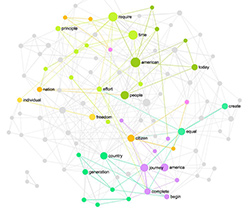Posted by Nodus Labs | June 18, 2013
Diffusion Cascades, The French Blogs Study
A recent study performed by a team of researchers from Complex Networks lab (LIP6 in Paris, France) has arrived to some interesting conclusions regarding information dissemination patterns in blogosphere. In their paper “Diffusion Cascades: Spreading Phenomena in Blog Network Communities” A. Salah Brahim, B. Le Grand and M. Latapy study the topological properties of diffusion cascades in selected influential Francophone blogs. Information cascades occur when blogs pick up a certain piece of information and start re-posting it, disseminating this information across the blogosphere. Most studies of information cascades use threshold model (how many citations in a blog’s neighborhood should occur in order for the blog to repost the information). This study, however, focuses on the topology of the cascades and the community structure, studying the lifetime of a certain piece of information as well as how far into blogosphere it gets. There are several interesting conclusions in this research:
1) Most of the blog posts are only cited once.
2) Cascades have in average a longer duration when citations are made between topically close posts (i.e. the same territory or community) or on the contrary between semantically distant posts.
3) Citation has to occur mostly between blogs from the same region (community) to ensure large diffusion.
4) The duration and the size of diffusion depends on the topic from which the post originated.
5) Cascades tend to be disassortative (i.e. everyone cites each other, there is no preferential attachment in disseminating the information: small blogs often pick up the stories from big blogs and vice versa).

